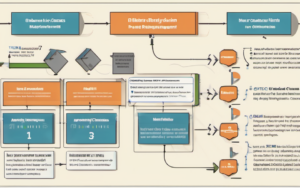Imagine a world where agreements are executed automatically, without the need for intermediaries or paperwork. This is the promise of smart contracts, a revolutionary technology that is transforming the way we interact with each other and with systems. Built upon the foundation of blockchain, smart contracts are self-executing agreements that are programmed to enforce the terms of a contract.
Introduction to Smart Contracts
What are Smart Contracts?
At their core, smart contracts are simply lines of code stored on a blockchain. They act as digital agreements that automatically execute when certain conditions are met. Think of them as self-enforcing contracts, where the terms are written directly into the code and enforced by the blockchain’s decentralized network.
The Essence of Automation
The real power of smart contracts lies in their ability to automate processes. They eliminate the need for manual intervention, reducing the risk of errors, delays, and disputes. By automatically executing terms based on pre-defined conditions, they create a more efficient and trustworthy system.
Beyond Traditional Contracts
Smart contracts go beyond traditional contracts by offering several key advantages. They are transparent, meaning anyone can view the code and the history of transactions. They are also immutable, ensuring that once a transaction is executed, it cannot be altered or reversed. This immutability provides a high level of security and trust.
How Smart Contracts Work
Blockchain Integration
Smart contracts are inextricably linked to blockchain technology. The blockchain serves as the foundation for storing and executing smart contracts. Each transaction is recorded on a distributed ledger, ensuring transparency and immutability.
Code as Law
The essence of a smart contract is its code. The terms of the agreement are written into the code, which is then deployed on the blockchain. This code acts as the law that governs the execution of the contract.
Execution and Verification
When the conditions specified in the smart contract are met, the code automatically executes the defined actions. These actions can include transferring assets, issuing tokens, or triggering other smart contracts. The blockchain network verifies and validates each transaction, ensuring that the contract is executed correctly.
Benefits of Smart Contracts
Transparency and Trust
Smart contracts are inherently transparent, with all transactions and code being publicly viewable on the blockchain. This transparency fosters trust among parties by providing a verifiable record of every interaction.
Efficiency and Automation
Smart contracts automate processes, reducing the need for manual intervention and streamlining workflows. This results in increased efficiency, faster turnaround times, and reduced costs.
Security and Immutability
The immutability of the blockchain protects smart contracts from tampering and fraud. Once a transaction is executed, it cannot be altered or reversed, providing a high level of security.
Real-World Applications of Smart Contracts
Decentralized Finance (DeFi)
Smart contracts are revolutionizing the finance industry, enabling the creation of decentralized applications (dApps) like lending platforms, decentralized exchanges, and stablecoins.
Supply Chain Management
Smart contracts can be used to track goods throughout the supply chain, ensuring transparency and reducing the risk of counterfeiting or fraud. They can also automate payments and streamline logistics.
Digital Identity and Voting
Smart contracts can be used to create secure and verifiable digital identities, eliminating the need for physical documents. They can also facilitate secure and transparent voting systems.
Challenges and Considerations
Security Vulnerabilities
As with any software, smart contracts are susceptible to security vulnerabilities. It is crucial to ensure that the code is thoroughly audited and tested before deployment.
Scalability and Performance
Smart contracts can face scalability and performance challenges, especially when dealing with high transaction volumes. This is an area of active research and development within the blockchain community.
Legal and Regulatory Frameworks
The legal and regulatory landscape around smart contracts is still evolving. It is important to consult with legal experts to ensure compliance with relevant regulations.
The Future of Smart Contracts
Interoperability and Cross-Chain Solutions
The future of smart contracts lies in the development of interoperable and cross-chain solutions. This will allow smart contracts to operate seamlessly across different blockchains, creating a truly interconnected ecosystem.
Emerging Use Cases
As the technology continues to evolve, we can expect to see even more innovative applications of smart contracts in various industries. This includes areas like healthcare, education, and government services.
The Potential for Disruption
Smart contracts have the potential to disrupt traditional industries and create new business models. They are empowering individuals and organizations to build more efficient, secure, and transparent systems.
By enabling trustless and automated interactions, smart contracts are paving the way for a future where transactions are faster, more secure, and more transparent. As the technology continues to evolve, we can expect to see even more innovative and impactful applications of smart contracts across a wide range of industries.




